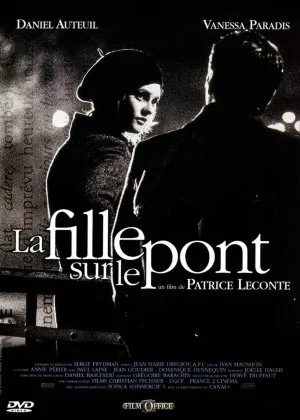The Girl on the Bridge

When all the stars align, magical things are bound to happen. Based on its individual merits there isn't really any good reason why I would be smitten with a film like The Girl on the Bridge [La Fille sur le Pont]. But somehow the sum of its individual parts is far greater than honest, down to earth math would suggest. Against all odds, Patrice Leconte delivers a film that crackles and sizzles and is well-equipped to withstand multiple viewings.
![screen capture of The Girl on the Bridge [La Fille sur le Pont]](/thumbs/img/articles/1200xauto/girl-bridge-1.webp)
In a sense The Girl on the Bridge is an ode to classic black and white cinema ('30s - '50s). There are obvious parallels to be drawn with movies like The Good German and The Artist, but ultimately Leconte's approach is the direct opposite of said films. Even though there's plenty of classic beauty here, it is brought to life through the use of playful, joyous and surprisingly modern details. It's not by revisiting the old that Leconte praises the cinema of yonder, but by raising it from the death and giving it a welcome make-over.
Even though the film's premise is pretty dark (a knife thrower down on his last luck rescues a suicidal girl ready to jump from a bridge, just so she can become his latest target) and the film's dialogues keep faithful to this morbid premise, the overarching atmosphere is surprisingly feel-good. The characters may be bruised and broken, but their conversations are playful and uplifting, as they slowly discover that by working together they can reverse their own bad luck.
Adèle is a young girl who left home in search of sexual intercourse, imprinted with the idea that this would kick-start her adult life. After several less than stellar experiences with men, she ends up on one of Paris' many bridges, contemplating her miserable life. There she runs into Gabor, a knife thrower who sees the perfect target in her. The two team up and after a stellar performance they begin their tour around Europe.
![screen capture of The Girl on the Bridge [La Fille sur le Pont]](/thumbs/img/articles/1200xauto/girl-bridge-2.webp)
Leconte's use of black and white photography is simply striking. Rich in contrast, slightly grainy and blessed with great use of lighting, the visuals pop right out of the screen. Characters and settings have a definite classical look, but the flashy camera work and snappy editing give the whole a very modern, lively feel. It's a superb contrast that works wonders. It's a little difficult to compare to other films, but I think Angel-A comes pretty close (minus the grain that is).
The soundtrack is fun and upbeat, though the first time I watched The Girl on the Bridge I had some trouble with its overall effect on the film. The combination of tracks is somewhat eclectic and appears to be all over the place. As a whole though, they align quite well to create a consistent atmosphere. There's one track in particular (repeated three times) that jumps out. Marianne Faithfull's Who Will Take My Dreams Away? (composed by Angelo Badalamenti of Mulholland Drive fame) is absolutely stunning and seizes any of the scenes it's in.
Taking up the lead roles are Daniel Auteuil (Caché) and Vanessa Paradis (singer/actor but best known as the wife of Johnny Depp). I'm not a big fan of either one of them, but they both do a tremendous job here. Auteuil is sharp and mysterious, Paradis is enigmatic and more than a little hard to read (but in a pleasant and charming way). They are a superb onscreen couple, which is a good thing as the whole film rests on their shoulders. The entire secondary cast only consists of characters that disappear as quickly as they appeared.
![screen capture of The Girl on the Bridge [La Fille sur le Pont]](/thumbs/img/articles/1200xauto/girl-bridge-3.webp)
Leconte brings two characters together who just hit a dead end in their lives. Lacking confidence and spirit, they motivate each other to turn around their own luck. But as is often the case, once things take a turn for the better they have trouble admitting to themselves that they can't go on without each other. Not being able to voice this drives them apart and from that exact moment the film starts to wander, if only just a little. Leconte makes absolutely sure the ending is fulfilling in every way that counts, but the scenes preceding it leave just a bit too much room for doubt.
It's only a minor critique on a film that sizzles and sparkles from start to finish. Leconte's approach is fresh and adventurous. There's a playfulness to the film's darker side that makes for an exciting contrast which is pretty much unique to this film. Add stellar performances by Auteuil and Paradis, superb black and white visuals and a fun soundtrack and what you have is a modern (though often overlooked) French cinema classic.